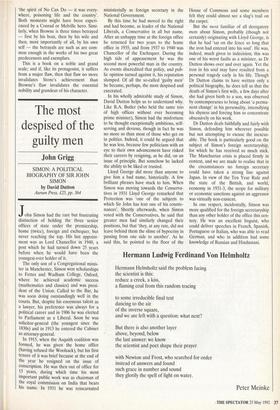The most despised of the guilty men
John Grigg
SIMON: A POLITICAL BIOGRAPHY OF SIR JOHN SIMON by David Dutton Aurum Press, £25, pp. 364 John Simon had the rare but frustrating distinction of holding the three senior offices of state under the premiership, home (twice), foreign and exchequer, but never reaching the top. His last appoint- ment was as Lord Chancellor in 1940, a post which he had turned down 25 years before when he would have been the youngest-ever holder of it.
The only son of a Congregational minis- ter in Manchester, Simon won scholarships to Fettes and Wadham College, Oxford, where he achieved academic success (mathematics and classics) and was presi- dent of the Union. Called to the Bar, he was soon doing outstandingly well in the courts. But, despite his enormous talent as a lawyer, his preference was always for a political career and in 1906 he was elected to Parliament as a Liberal. Soon he was solicitor-general (the youngest since the 1830s) and in 1913 he entered the Cabinet as attorney-general.
In 1915, when the Asquith coalition was formed, he was given the home office (having refused the Woolsack), but his first tenure of it was brief because at the end of the year he resigned on the issue of conscription. He was then out of office for 15 years, during which time his most Important public work was as chairman of the royal commission on India that bears his name. In 1931 he was reincarnated ministerially as foreign secretary in the National Government.
By this time he had moved to the right and had become, as leader of the National Liberals, a Conservative in all but name. After an unhappy time at the foreign office he returned for two years to the home office in 1935, and from 1937 to 1940 was Chancellor of the Exchequer. During the high tide of appeasement he was the second most powerful man in the country. As events discredited that policy, and pub- lic opinion turned against it, his reputation slumped. Of all the so-called 'guilty men' he became, perhaps, the most despised and execrated.
In his wholly admirable study of Simon, David Dutton helps us to understand why. Like R.A. Butler (who held the same trio of high offices without ever becoming prime minister), Simon had the misfortune to be thought exceptionally ambitious, self- serving and devious, though in fact he was no more so than most of those who get on in politics. Indeed, it could be argued that he was less, because few politicians with an eye to their own advancement have risked their careers by resigning, as he did, on an issue of principle. But somehow he lacked the ability to be liked or trusted.
Lloyd George did more than anyone to give him a bad name, historically. A few brilliant phrases have stuck to him. When Simon was moving towards the Conserva- tives in 1931 Lloyd George remarked that Protection was 'one of the subjects to which Sir John has lent one of his counte- nances'. Shortly afterwards, when Simon voted with the Conservatives, he said that greater men had similarly changed their positions, but that 'they, at any rate, did not leave behind them the slime of hypocrisy in passing from one side to another'. As he said this, he pointed to the floor of the House of Commons and some members felt they could almost see a slug's trail on the carpet.
But the most familiar of all derogatory mots about Simon, probably (though not certainly) originating with Lloyd George, is that he had 'sat on the fence so long that the iron had entered into his soul'. He was, indeed, much given to indecision; this was one of his worst faults as a minister, as Dr Dutton shows over and over again. Yet the iron in his soul may have resulted from a personal tragedy early in his life. Though Dr Dutton claims to have written only a political biography, he does tell us that the death of Simon's first wife, a few days after she had given birth to a son, was observed by contemporaries to bring about 'a perma- nent change' in his personality, intensifying his shyness and forcing him to concentrate obsessively on his work.
Dr Dutton deals faithfully and fairly with Simon, defending him wherever possible but not attempting to excuse the inexcus- able. The book is particularly good on the subject of Simon's foreign secretaryship, for which he has received so much stick. The Manchurian crisis is placed firmly in context, and we are made to realise that in the circumstances no foreign secretary could have taken a strong line against Japan. In view of the Ten Year Rule and the state of the British, and world, economy in 1931-3, the scope for military or economic sanctions against an aggressor was virtually non-existent.
In one respect, incidentally, Simon was more qualified for the foreign secretaryship than any other holder of the office this cen- tury. He was an excellent linguist, who could deliver speeches in French, Spanish, Portuguese or Italian, who was able to read German, and who in addition had some knowledge of Russian and Hindustani.


































































 Previous page
Previous page